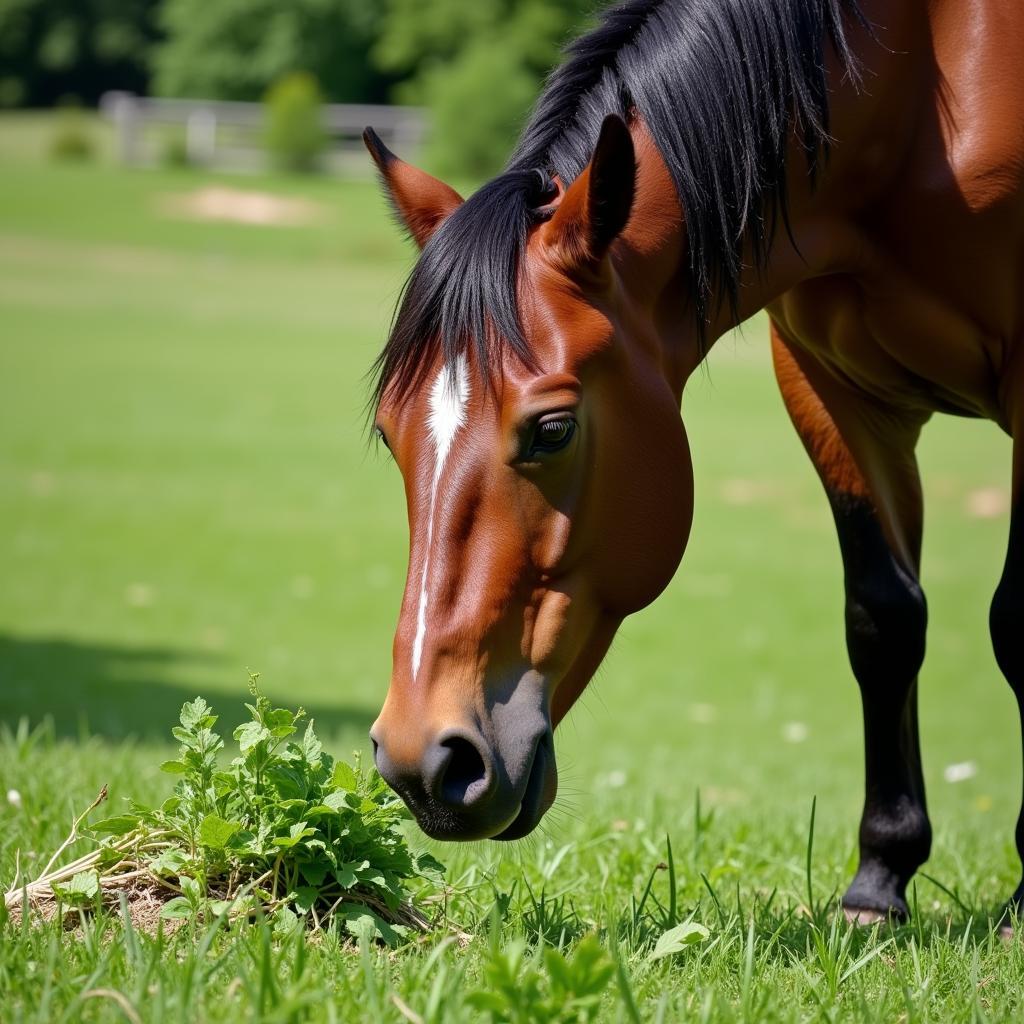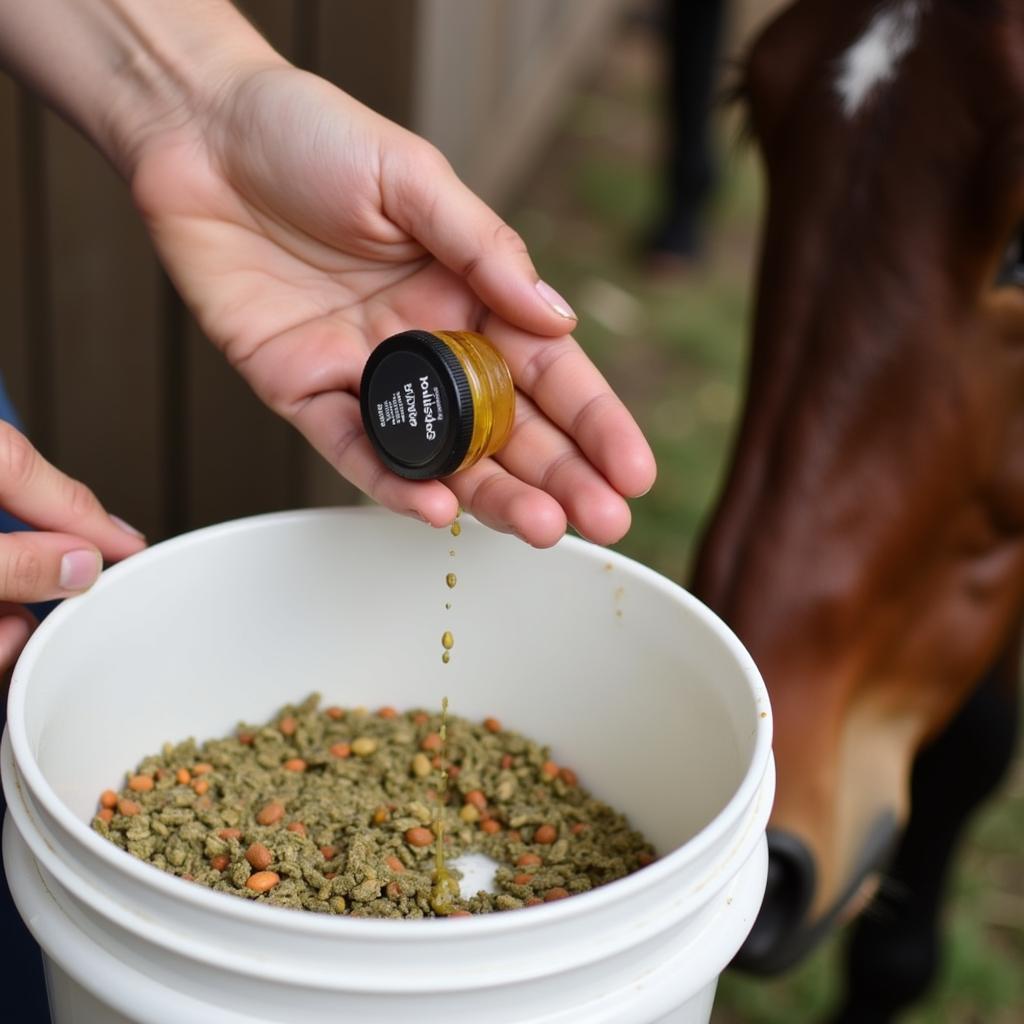Herbal Remedies For Horses have been used for centuries to support their health and well-being. From calming anxieties to soothing sore muscles, natural remedies offer a holistic approach to equine care. This article explores the benefits, uses, and considerations for incorporating herbal remedies into your horse’s health regimen.
Are you looking for natural ways to support your horse’s health? Herbal remedies can be a valuable addition to your horse’s care, offering support for various conditions and promoting overall wellness. From calming a stressed horse to boosting the immune system, herbs can provide gentle and effective support. However, it’s crucial to approach herbal remedies with knowledge and caution. Understanding proper dosage, potential interactions, and the importance of veterinary guidance is essential for safe and effective use.
Understanding the Power of Plants for Equine Health
Herbs contain a complex array of bioactive compounds that can exert therapeutic effects on the body. These compounds interact with various systems, influencing everything from digestion and inflammation to mood and energy levels. For horses, herbal remedies can be used to address a range of health concerns, including:
-
Stress and Anxiety: Herbs like chamomile, valerian root, and lavender can help calm anxious horses, particularly during travel, competitions, or other stressful situations. You may also consider a stress less horse supplement for additional support.
-
Muscle Soreness and Inflammation: Devil’s claw, yucca, and meadowsweet are known for their anti-inflammatory properties and can help ease muscle soreness and stiffness in horses, particularly those engaged in strenuous activity.
-
Respiratory Health: Herbs such as licorice root, elecampane, and mullein can support respiratory health, helping to clear airways and soothe coughs.
-
Digestive Support: Ginger, peppermint, and fennel can aid digestion, relieve gas, and promote gut health in horses. Natural remedies for horses tying up can include certain herbs, but always consult with your veterinarian first.
-
Immune System Boost: Echinacea, astragalus, and elderberry are known for their immune-boosting properties and can help support the horse’s natural defenses.
 Horse enjoying herbal treats in a pasture
Horse enjoying herbal treats in a pasture
Choosing and Using Herbal Remedies for Horses
Selecting the right herbal remedy for your horse requires careful consideration. Here are some key factors to keep in mind:
-
Quality: Choose high-quality herbs from reputable suppliers. Look for organic and sustainably sourced products whenever possible.
-
Form: Herbal remedies come in various forms, including dried herbs, tinctures, powders, and capsules. Choose the form that is most convenient for you and palatable for your horse. If considering Ovamed for horses, consult with your vet regarding dosage and administration.
-
Dosage: Follow the recommended dosage instructions carefully. Start with a low dose and gradually increase it as needed. Overdosing can be harmful.
-
Veterinary Guidance: Always consult with your veterinarian before giving your horse any herbal remedies, especially if your horse is pregnant, lactating, or has any underlying health conditions. They can also advise on proper Dectomax for horses dosage, ensuring the safety and effectiveness of combined treatments.
Are Herbal Remedies Safe for Horses?
When used correctly, herbal remedies can be a safe and effective way to support your horse’s health. However, it’s important to remember that “natural” doesn’t always mean “safe.” Some herbs can interact with medications or have adverse effects. Always consult your veterinarian before using any herbal remedies, especially if your horse has pre-existing conditions or is taking other medications. For example, you might be considering a non-prescription sedative for horses and also want to incorporate herbal remedies; discussing this combination with your vet is vital.
Integrating Herbal Remedies into Your Horse’s Care
Adding herbal remedies to your horse’s routine should be done gradually. Start with a small dose and monitor your horse closely for any reactions. Keep a detailed record of the herbs you are using, the dosage, and any observed effects. This will help you and your veterinarian assess the effectiveness of the remedies and make adjustments as needed.
 Horse receiving an herbal supplement
Horse receiving an herbal supplement
In conclusion, herbal remedies for horses offer a natural and holistic approach to supporting equine health and wellness. By carefully selecting and using these remedies under the guidance of a veterinarian, you can enhance your horse’s well-being and address a range of health concerns.
FAQ
-
What are some common herbal remedies for calming anxious horses?
Chamomile, valerian root, and lavender are often used to soothe anxious horses. -
Can herbal remedies replace conventional veterinary care?
No, herbal remedies should be used in conjunction with, not in replacement of, conventional veterinary care. -
Where can I purchase high-quality herbal remedies for my horse?
Reputable equine supply stores and online retailers specializing in natural horse products are good sources. -
How do I determine the correct dosage of an herbal remedy for my horse?
Always consult with your veterinarian or follow the manufacturer’s instructions for dosage guidelines. -
Are there any potential side effects of using herbal remedies for horses?
While generally safe when used correctly, some herbs can interact with medications or cause adverse reactions. Consult with your veterinarian. -
What are some herbs that can help with muscle soreness in horses?
Devil’s claw, yucca, and meadowsweet are known for their anti-inflammatory properties. -
Can I give my horse herbal remedies if it’s pregnant or lactating?
Always consult your veterinarian before giving any herbal remedies to a pregnant or lactating mare.
For further support, consider these resources: Dectomax for horses dosage, Natural remedies for horses tying up, Non-prescription sedative for horses, Ovamed for horses, and Stress less horse supplement.
Need more help? Contact us! Phone: 0772127271, Email: [email protected] Or visit us at: QGM2+WX2, Vị Trung, Vị Thuỷ, Hậu Giang, Việt Nam. We have a 24/7 customer service team.